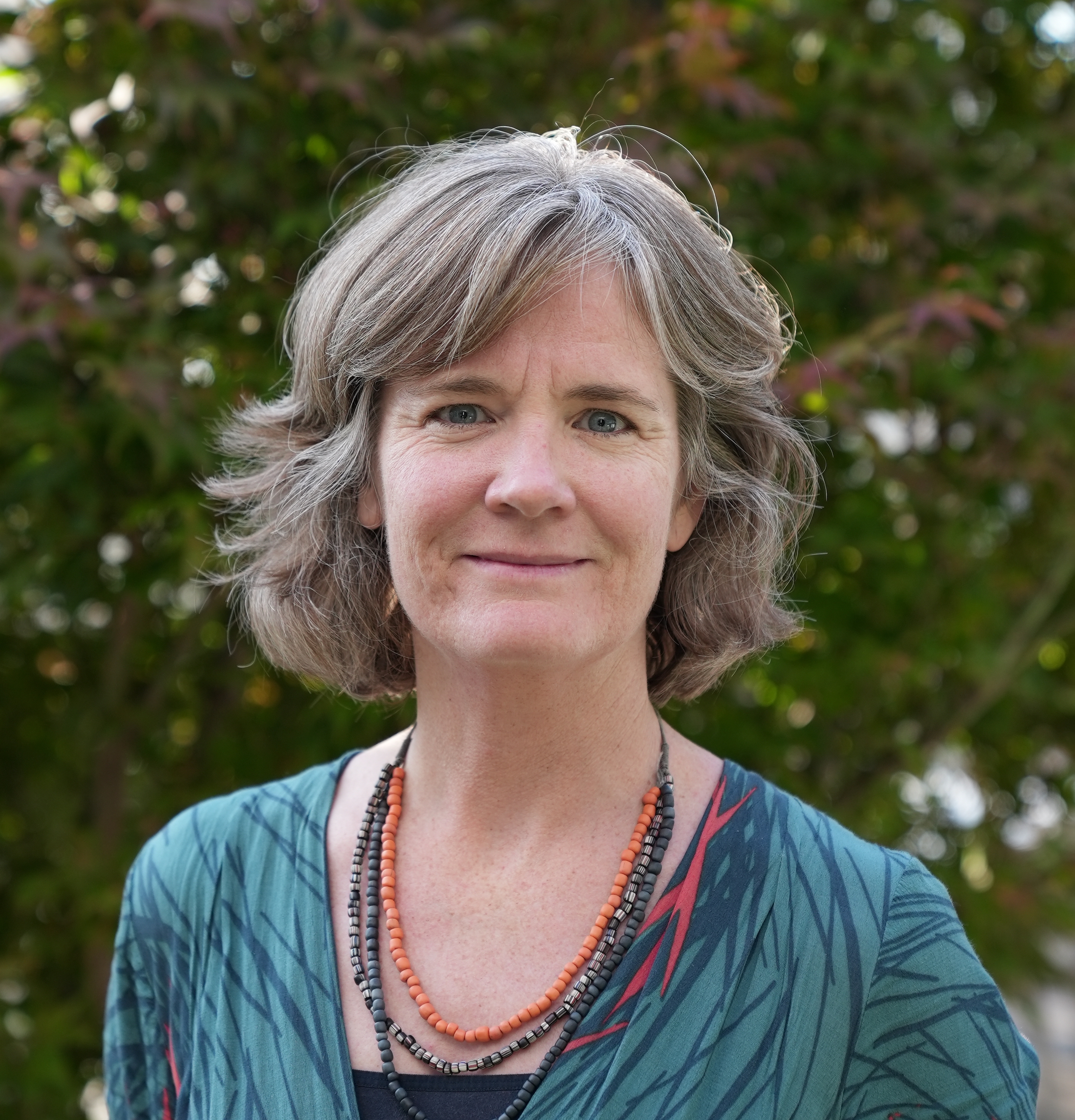City of Melbourne Chair in Urban Resilience and Innovation
Fostering research and training in the field of city resilience and innovation.
Co Designing Urban Resilience
Cities face increasing frequency, duration and intensity of acute shocks, such as storms, and chronic stresses, such as economic inequality. Multiple and overlapping hazards threaten to disrupt lives, livelihoods and progress towards sustainable development. Shocks and stresses are interdependent, further increasing the complexity of challenges to be addressed. For example, the chronic stress of poverty can exacerbate the impact of the acute shock of extreme heat on vulnerable individuals and families; flooding can cause infrastructure failures through disruption to power, water and transport networks. The complexity of urban hazards mean that they cannot be addressed by any single agency, sector or discipline. Working with stakeholders and communities is an essential part of developing strategies, policies and programs for resilience to complex hazards in cities.
Our work is underpinned by co-design principles and methods. Our purpose is to:
- Co-produce research and innovation outcomes to enhance the resilience of the City of Melbourne
- Contribute world-class, scholarly research on sustainable, resilient and healthy cities
- Demonstrate a constructive, dynamic relationship between the university and the city, as an international model of best practice
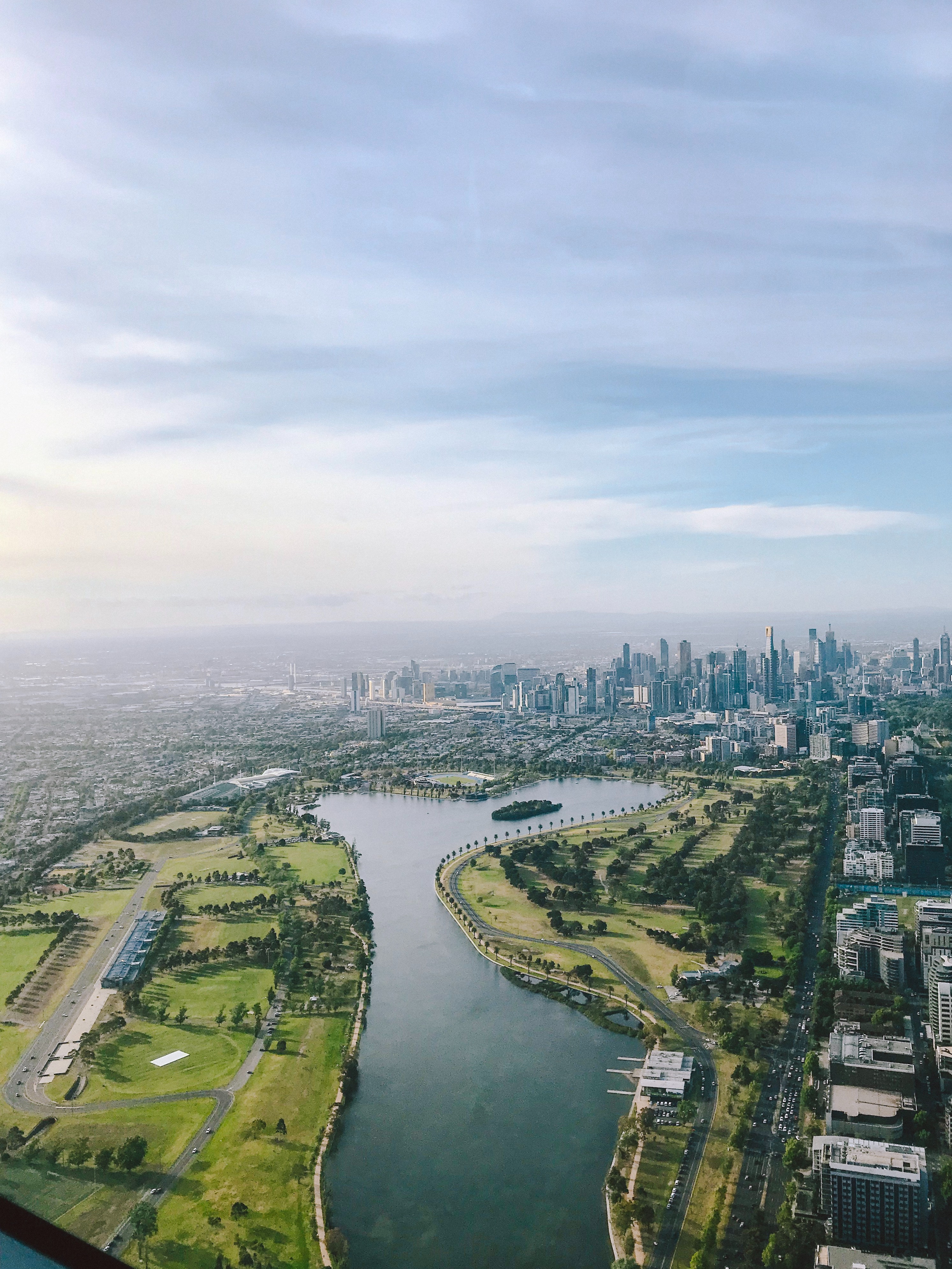
Urban resilience is the capacity of individuals, communities, institutions, businesses, and systems within a city to adapt, survive and thrive no matter what kind of chronic stresses and acute shocks we experience, and to positively transform as a result. The Urban Resilience and Innovation Program in the Melbourne Centre for Cities interrogates the relationships between urban decision-making and resilience, using action research in partnership with the City of Melbourne and key stakeholders. The Urban Resilience Framework for Local Government underpins the Urban Resilience and Innovation Program, highlighting the core qualities of resilient urban systems as: prepared, robust, spare capacity, diverse, reflective, integrated, inclusive, flexible, future-focused, and innovative.
Co-design is based on the principles that an end-user of a particular design has the right to have a voice in the design process. Engaging stakeholders, communities and users in design and delivery of urban systems is essential to improve urban and community resilience. Our co-design approach draws on the Bottom-Up Infrastructure method.
Our Co-designing Urban Resilience work program has two main themes:
- Retrofitting cities for resilience to climate, biodiversity and public health emergencies. Visit the Retrofit Lab for more information.
- Climate justice involving vulnerable communities in decisions about social and technical actions to improve climate resilience.
University of Melbourne Researchers and Staff

Marita Doak
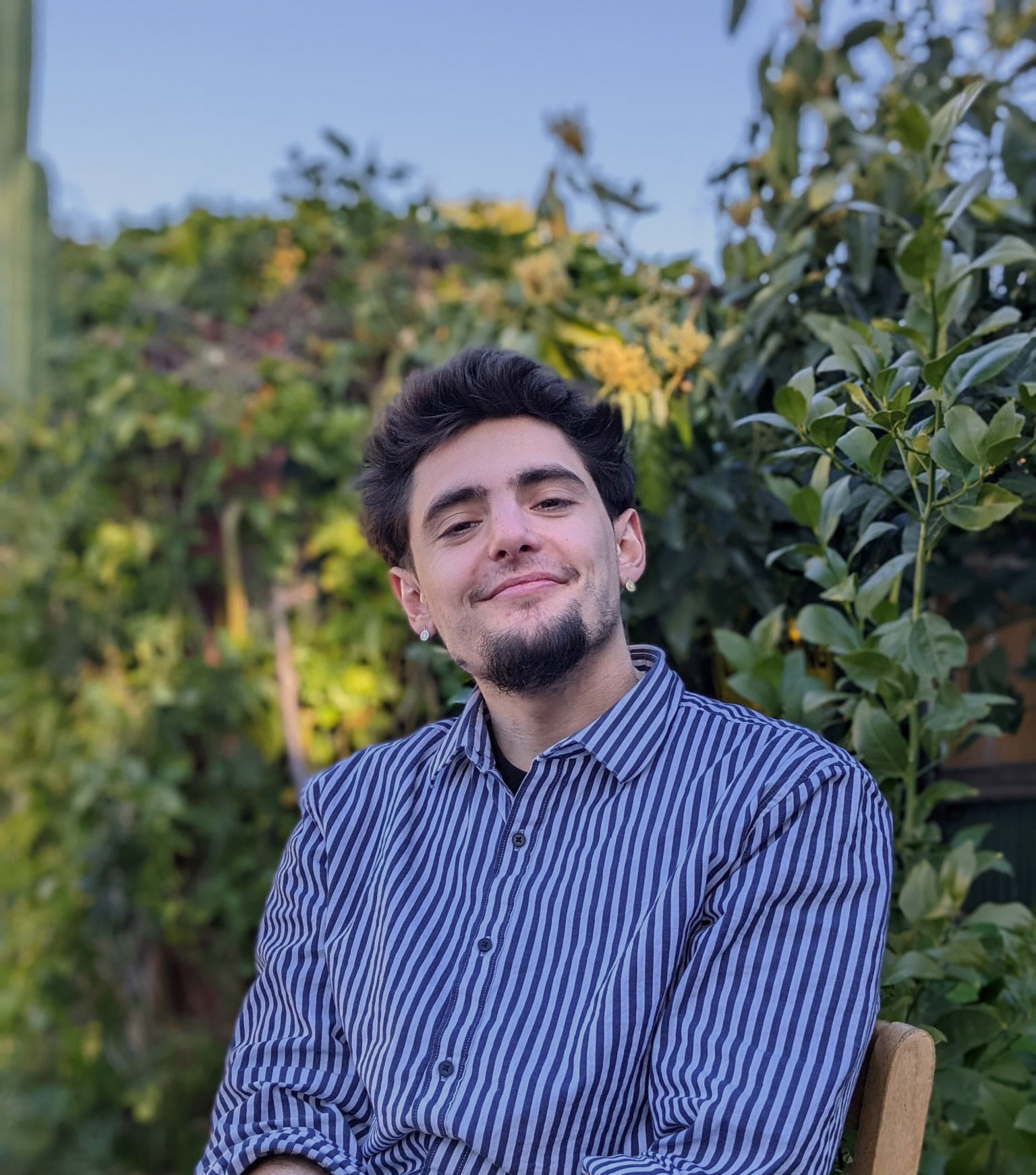
Enzo Lara - Hamilton
Professor Bell’s work connects the urban resilience and innovation activities of both the City and the University, providing scholarship and research that strengthens policy responses and community engagement.
Professor Sarah Bell joined the University in 2021 as the City of Melbourne Chair in Urban Resilience and Innovation. Prior to this, Sarah worked for 16 years at University College London as Professor of Environmental Engineering with The Bartlett School of Environment, Energy and Resources in University College London (UCL). Professor Bell is a leader in the field of urban water sustainability and is distinguished by her attention to the transdisciplinary nature of the challenge of sustainability. Her scholarly work draws on the social sciences to better understand how people, technologies and nature interact to create urban systems.
She is a Fellow of Engineers Australia. Her PhD in Sustainability and Technology Policy is from Murdoch University and she studied Engineering and Science as an undergraduate at the University of Western Australia.
Scholarly Works
View complete list of scholarly outputs for the City of Melbourne Chair in Urban Resilience and Innovation via Find an Expert
View here
Podcasts
The City Resilience in Melbourne Podcast explores the City of Melbourne's ability to adapt, survive, and thrive in the face of shocks and stresses, both acute and chronic.
Latest
-
Bottom-up Infrastructure
Putting communities at the heart of engineering design and decision-making to create resilient and sustainable environments under conditions of uncertainty
- Collaboration
-
Urban resilience for local government: Issues Paper
This Issues Paper provides an overview of the concepts, definitions, and qualities of urban resilience to better understand how to address the challenges of the future with the ideas of today.
- Issues Paper
-
Urban resilience for local government: Briefing Paper
Urban resilience has emerged and rapidly developed as a concept to assist cities to respond to acute shocks and chronic stresses. This briefing paper, which accompanies a more detailed Issues Paper, provides an overview of the main concepts, definitions and qualities of resilience.
- Briefing Paper
-
Urban Resilience: What's next for Melbourne?
As Melbourne emerges from one of the world's longest lockdowns under COVID-19 restrictions, what have we learnt about the resilience of cities to shocks and stresses? What lessons can we draw for future challenges, such as the task of decarbonising our cities and industries, or coping with the impacts of climate change?
- event
-
Rapid retrofit research to help get workers back to the office
The City of Melbourne has unveiled an innovative new project to minimise COVID-19 transmission in office buildings by retrofitting ventilation systems. The pilot research project ‘BREATH’ will trial and evaluate different ventilation systems in a vacant CBD building, in partnership with the University of Melbourne and CBUS Property.
- Project
-
Launch of The Lancet Global Health Series on Urban Design, Transport and Health
The Lancet Global Health hosted an on-line global webinar to present the series’ findings and a panel discussion
- Event
-
The Lancet Global Health
Dr Melanie Lowe at the Melbourne Centre for Cities is lead author of the first paper in the series, and co-author on the other four papers.
- Publication
-
Australian Cities Failing on Walkability
The World Heath Organization has set targets to promote physical activity but an international study shows Australian cities are built around cars rather than encouraging walking
- Pursuit
-
Global Observatory of Healthy and Sustainable Cities
A global, multi-institutional, transdisciplinary initiative providing evidence-based spatial and urban policy indicators to advocate for and track progress towards healthy and sustainable cities for all.
- Collaboration
-
City of Melbourne Chair in Urban Resilience and Innovation Impact Report 2021 - 2022
Professor Sarah Bell commenced as City of Melbourne Chair on 1 February 2021 and is working to connect the urban resilience and innovation activities of both the City and the University. Read the 2021 - 2022 Urban Resilience and Innovation Impact Report here
-
Award for Planning Research Excellence, 'Benchmarking Healthy and Sustainable Cities Globally'
Dr Melanie Lowe, along with colleagues at RMIT and ACU, was awarded the Planning Institute of Australia (Victoria) Award for Planning Research Excellence, for the project 'Benchmarking Healthy and Sustainable Cities Globally'
-
Circle Distinguished Lecture Series: Co-designing Urban Resilience
This lecture outlines the Bottom-Up Infrastructure co-design method as it was developed through case studies of urban drainage, the water-energy-food nexus and air pollution
-
NEW BOOK! Co-Designing Infrastructures: Community collaboration for liveable cities
Co-designing Infrastructures tells the story of a research programme designed to bring the power of engineering and technology into the hands of grassroots community groups, to create bottom-up solutions to global crises.
-
PhD Scholarship: Co-Designing Climate Justice
-
The Age: These apartments were built just five years ago. Now they’re being demolished
An Age article on The City of Melbourne decision to approve the demolition of the RMIT Village development on the Haymarket roundabout and turn it into a new 19-storey student housing building with build-to-rent apartments.
- MC4C IN THE MEDIA
-
Pursuit: Five ways retrofitting cities can help decarbonise our future
New construction is the source of massive amounts of carbon pollution. Retrofitting existing infrastructure is cleaner, and brings multiple benefits.
- MC4C IN THE MEDIA
-
The $160m cost of not knocking down this city skyscraper
Sarah Bell, University of Melbourne chair in urban resilience and innovation, said more developers and builders needed to retrofit buildings to address the energy used to construct buildings, known as embodied carbon, and the resources wasted in demolition.
- MC4C IN THE MEDIA
-
Retrofit Symposium
The Retrofit Symposium brings together academic, government and industry experts to set the national research agenda to support the transformation of Australian cities.
Flooding, fires, the pandemic and other disasters have recently tested the resilience of Victoria’s communities, infrastructure, environment and economy. Resilience Roundtables are a series of discussions to share knowledge about work to improve resilience across the state. Hosted by the University of Melbourne, Resilience Roundtables will bring together professionals, policy-makers, community leaders and researchers. The meetings will be 1:00pm - 2:00pm on the third Thursday of every month, at the University of Melbourne and on-line.
Intended Audience: The roundtables aim to create a community of practice for resilience practitioners and researchers in Victoria. We encourage local government , state government, community, emergency management, consultants, academics and those interested in the resilience space to attend.
Resilient Housing:
regional approaches to retrofit
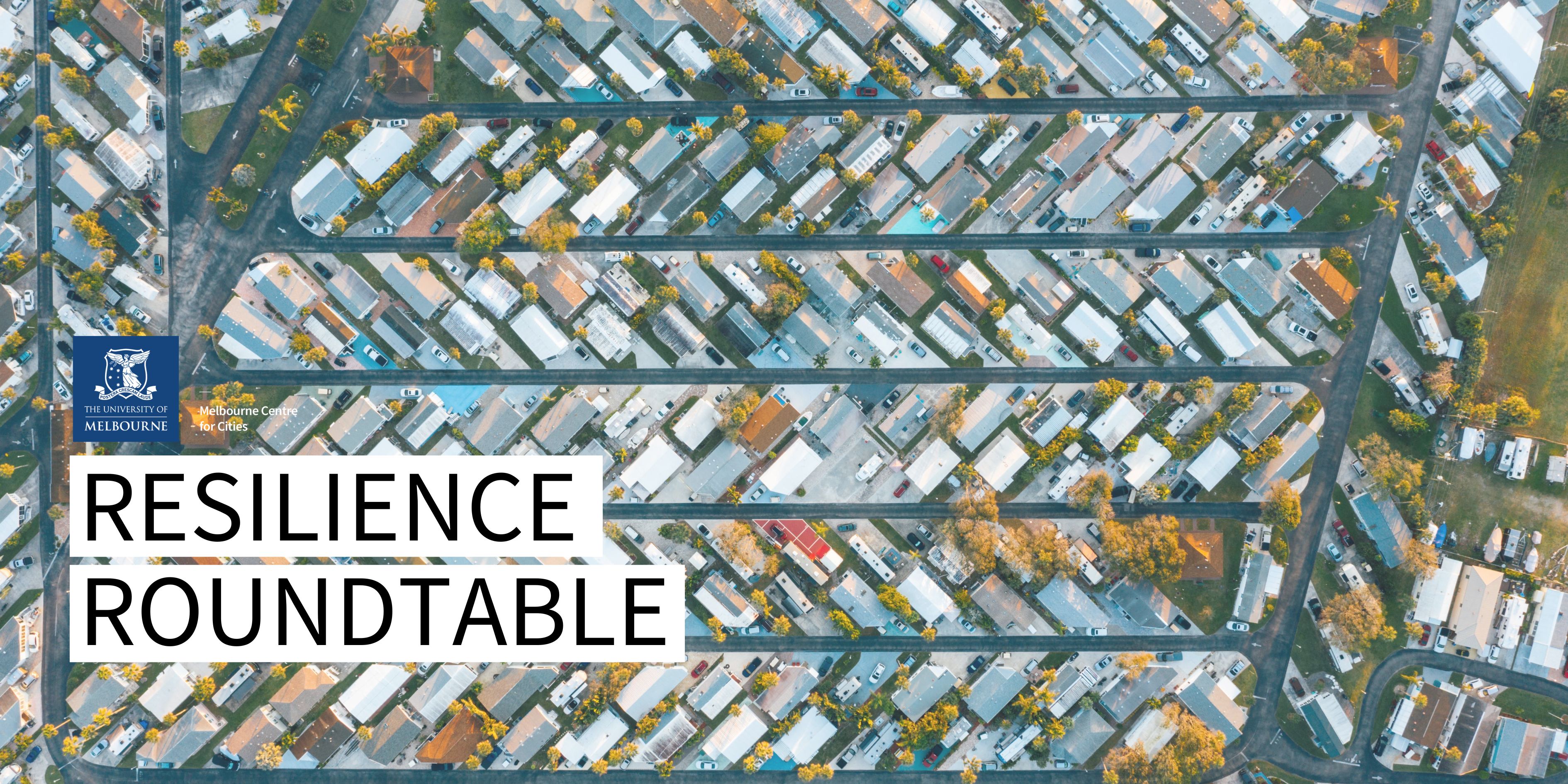
This session focuses on research collaboration for grounded, localised approaches to resilient housing in regional Victoria. The presenters will discuss topics focused on resilience based retrofit, the Housing Energy Efficiency Transitions project, assessments and guides for households, and the advantages of expanding housing infrastructure improvements for the public.
Speakers
- Alison Whitten, Director of the Castlemaine Institute
- Trivess Moore, Senior Lecturer School of Property, Construction and Project Management at RMIT University
Thursday, 16 Nov 1:00-2:00 AEST
Online: Via Zoom- Join on your computer or mobile app
In person: The Dean's Conference Room, L1 room 102,
The University of Melbourne
Resilience Data to Strategy
(Postponed to 2024)
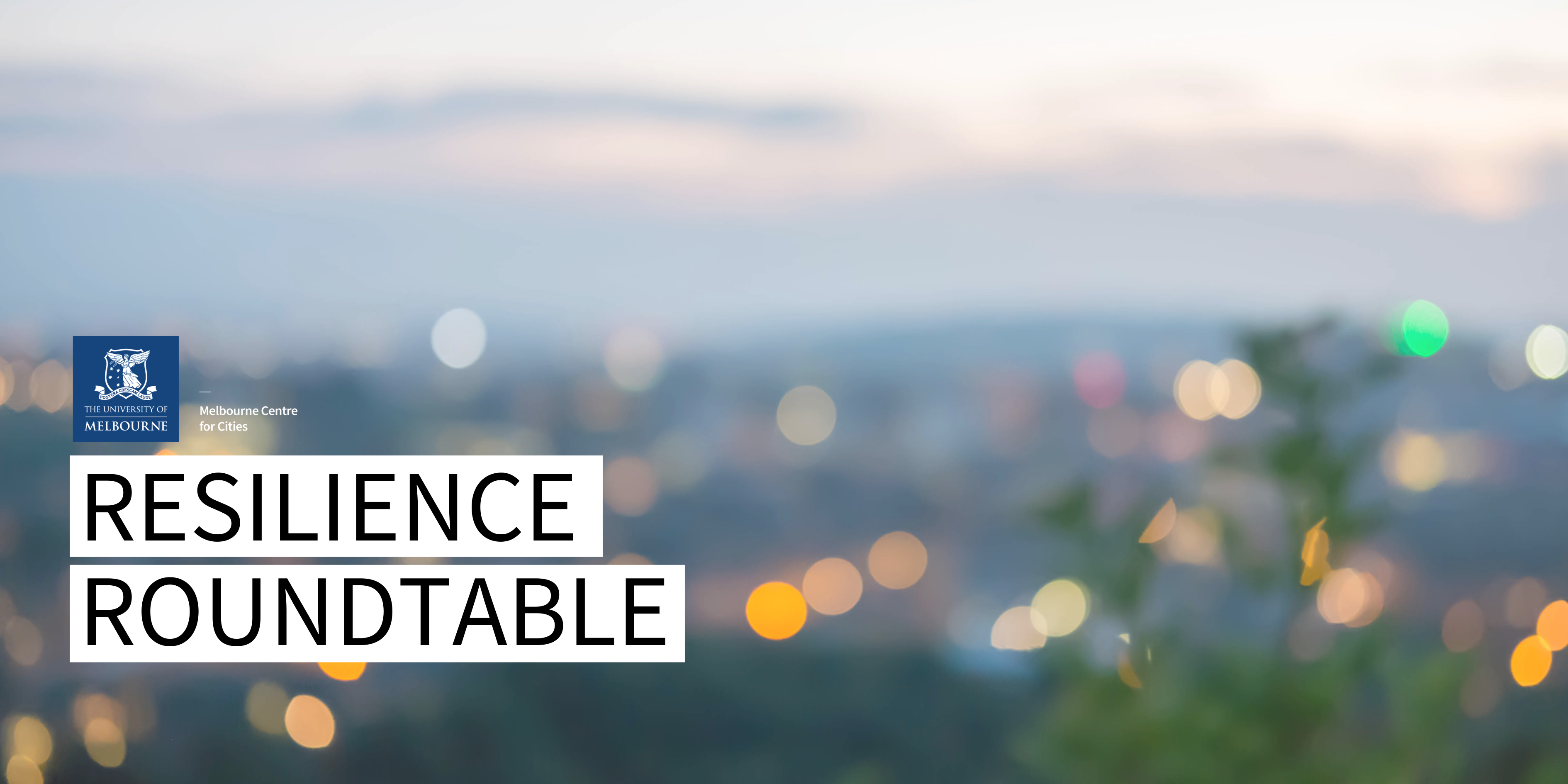
Speakers:
- Dr Tom Logan, Pūkenga Matua o Pūnaha Metarahi, Senior Lecturer in Civil Systems Engineering, University of Canterbury, Te Whare Wānanga o Waitaha
- Hayley Jarvis, Senior Resilience Officer, Climate & Resilience, Transport & Sustainability at Wyndham City Council
- Helen Kerley, Coordinator Climate & Resilience, Climate & Resilience, Transport & Sustainability at Wyndham City Council
Previous Roundtables
Water: Enabling Resilience and Urban Cooling
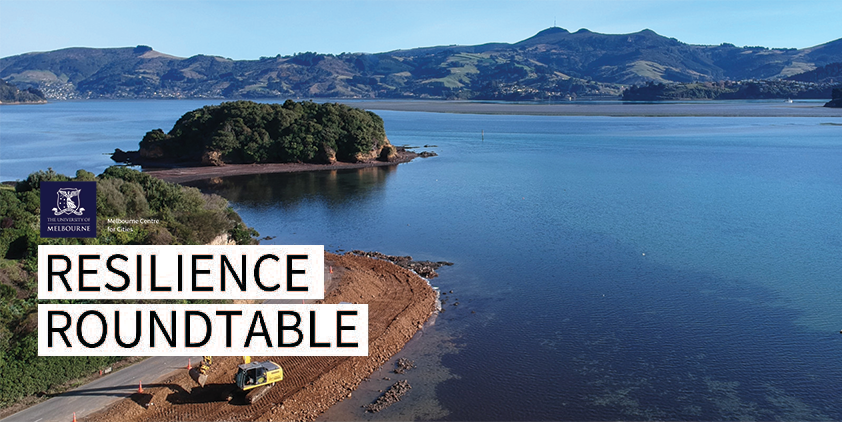
This session sets out to demonstrate that smart IoT irrigation and misting systems can contribute to cooler and greener residential environments. Cooler surrounds leads to lower housing energy costs, healthier people, and happier communities.
Speakers:
- Dr David Bergmann, South East Water
- Dr Kerry Nice, University of Melbourne
Wed, 19 October, 1:00-2:00 AEST
Resilience in Melbourne
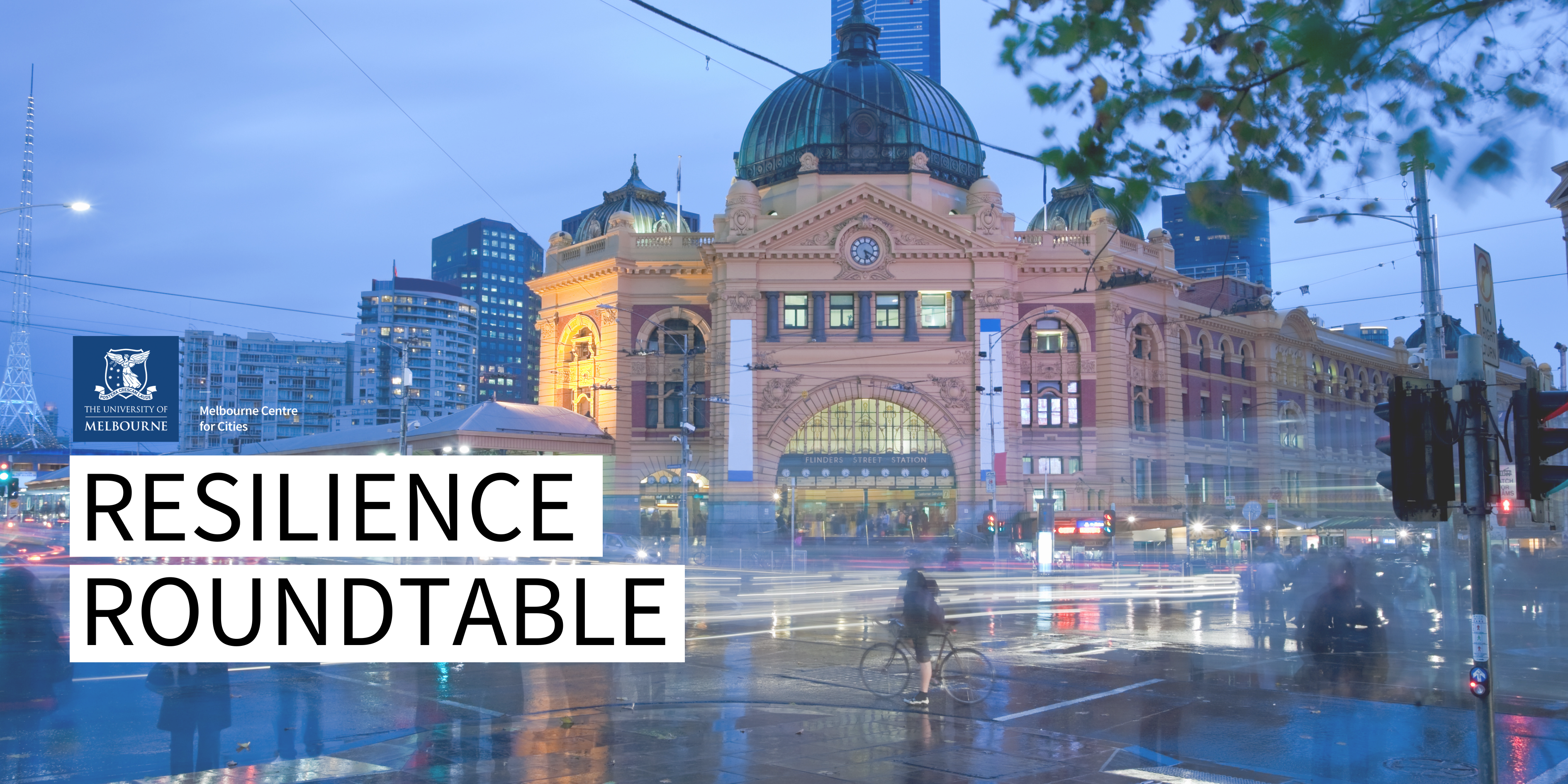
Speakers:
- David Sweeting, Co-Manager, City Resilience and Sustainable Futures (CoM)
- Professor Sarah Bell , City of Melbourne Chair in Urban Resilience and Innovation (UoM)
Resilience outcomes in the Yarra Ranges and the opportunities and obstacles of urban planning
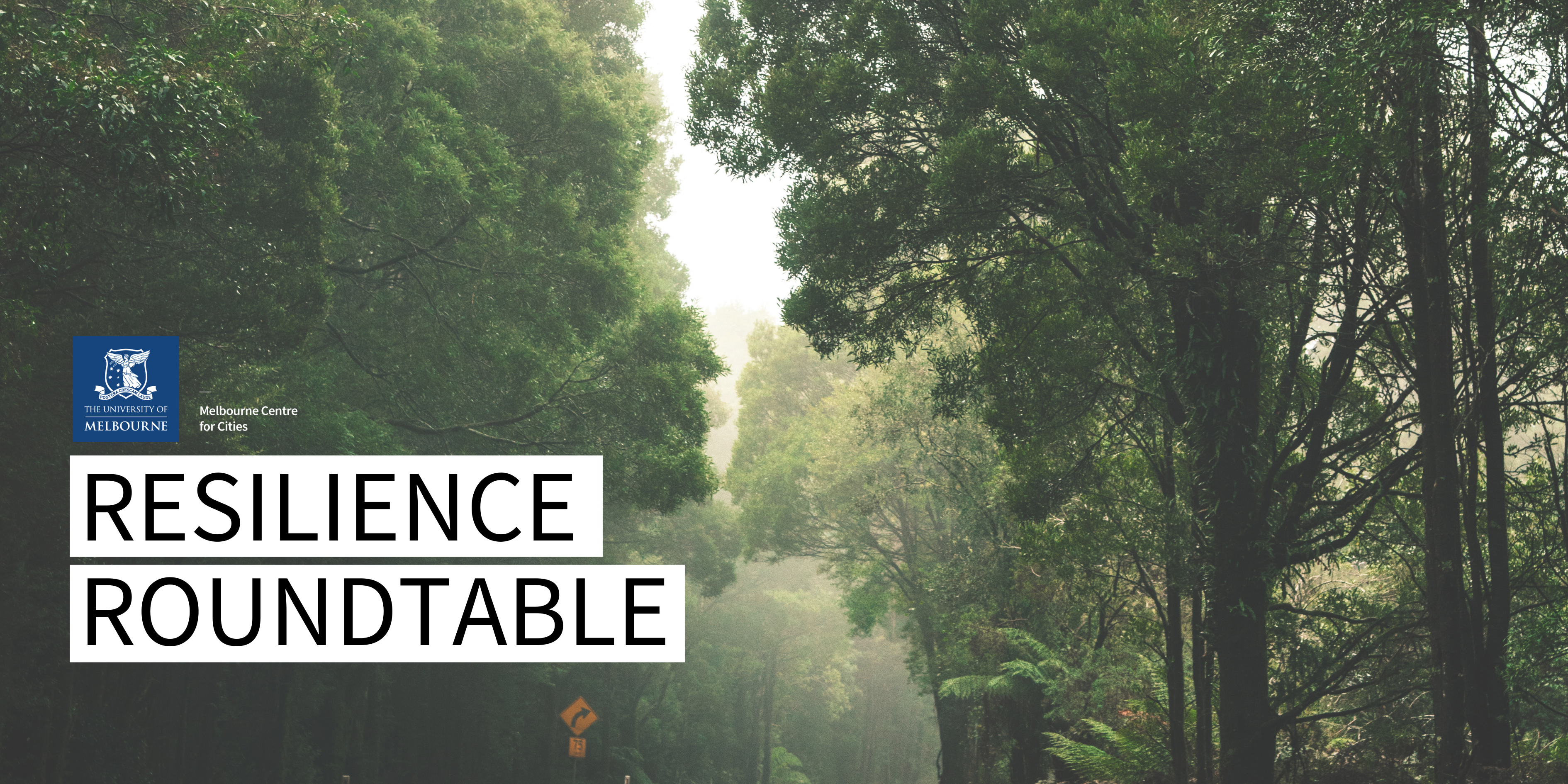
Speakers:
- Dr Alan March, Professor of Urban Planning and Disaster Risk Reduction (UoM),
- Esther Gallois, Strategy Evaluation Consultant for Organisational Strategy at Yarra Ranges Council
- Rob Cornish, Executive Officer of Organisational Strategy at Yarra Ranges Council
- Lisa Keedle, Executive Officer of Emergency Management at Yarra Ranges Council
Meeting the Challenges of a Multi-Disaster World
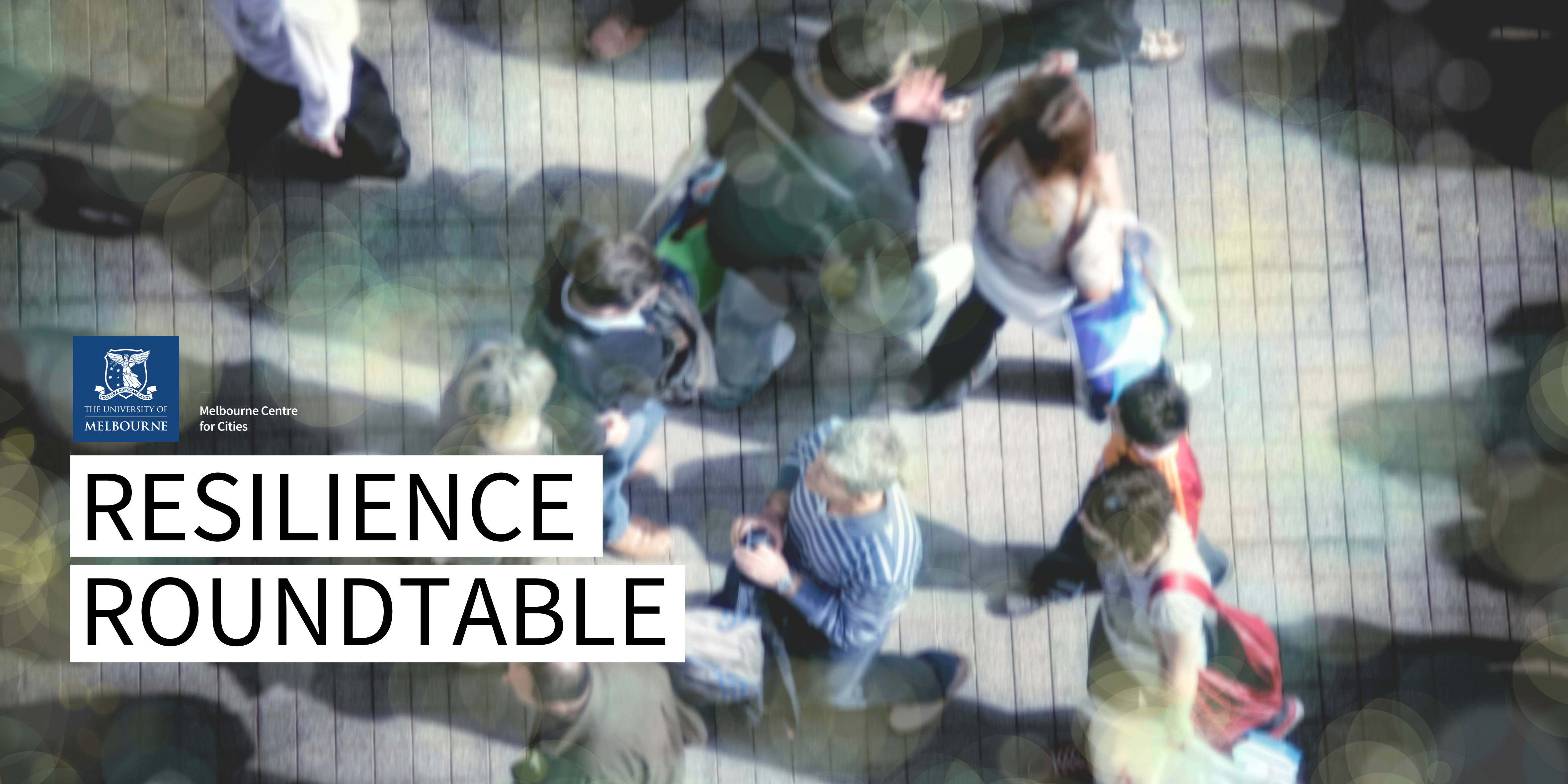
Speakers:
- Professor Lisa Gibbs, Director, Child & Community Wellbeing Unit, Centre for Health Equity, Melbourne School of Population and Global Health
- Andrew Coghlan, Head of Emergency Services at Australian Red Cross
